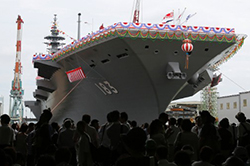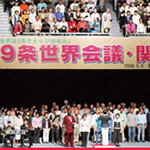
|
 |
|
|
Dear Friends and Supporters of Article 9,
We are pleased to send you our quarterly eNewsletter for July - September, 2013 with some information about the Global Article 9 Campaign to Abolish War's recent activities and related developments, amidst intense debate on revising Japan's peace constitution.
|
|
|
NEWS FROM JAPAN - A BACKDOOR APPROACH TO CHANGING ARTICLE 9
 On July 21, Japan held elections of the Upper House of the Diet (Parliament). As expected, Prime Minister Abe Shinzo, his Liberal Democratic Party (LDP) and ruling coalition secured a majority – mostly thanks to Abe’s economic agenda. He did not, however, obtain the two-third of the seats he was hoping for in order to push forward his long-cherished agenda of revising Japan's constitution, notably to change the requirements for constitutional amendments, curtail war-renouncing Article 9 and allow Japan to exercise collective military action. On July 21, Japan held elections of the Upper House of the Diet (Parliament). As expected, Prime Minister Abe Shinzo, his Liberal Democratic Party (LDP) and ruling coalition secured a majority – mostly thanks to Abe’s economic agenda. He did not, however, obtain the two-third of the seats he was hoping for in order to push forward his long-cherished agenda of revising Japan's constitution, notably to change the requirements for constitutional amendments, curtail war-renouncing Article 9 and allow Japan to exercise collective military action.
Following the elections, in light of the low popular support for constitutional revision and the skepticism of some of his coalition partners, Abe suggested he would not rush into it, seeking instead to "expand, and deepen" the debate.
However, several developments indicate that the debate has since in fact accelerated and taken a new turn, with Abe seemingly having chosen a backdoor approach to achieve his goal.
Aso’s Nazi Germany “Gaffe”
A few days after the elections, Deputy Prime Minister Aso Taro was quoted saying the administration should learn from Nazi Germany as he spoke of constitutional amendment. "The German Weimar constitution changed, without being noticed, to the Nazi German constitution. Why don't we learn from their tactics?", he asked during a public speech at the conservative Japan Institute for National Fundamentals.
Aso’s remarks triggered outrage in neighboring countries that suffered Japanese occupation during the Second World War, as well as among Jewish and other international groups.
Although the government tried to distance itself from the comments, and Aso attempted to clarify his statement (he claims he had meant to seek a calm and in-depth debate on the constitution), he has refused to step down – as requested by opposition parties– let alone apologize.
If you can’t change it – reinterpret it
The Aso “incident” comforted Abe in his decision not to push for constitutional amendment frontally, but instead seek to change the government’s traditional interpretation of the Constitution’s Article 9.
Over the years, successive governments have maintained that if international law (notably through the UN Charter) grants Japan a right to collective self-defense, Article 9 does not allow the country to exercise it.
During his first mandate in 2007, Abe set up the Advisory Panel on Reconstruction of the Legal Basis for Security. In its 2008 report, the Panel had advocated that Japan's exercise of the right to collective self-defense be allowed in limited cases. But the report, was never acted upon as it came out after Abe had resigned as Prime Minister.
Revived shortly after Abe took up his second mandate in December 2012, the Panel is expected to release its final report by the end of the year. According to its Chairman Yanai Shunji, the report is likely to recommend this time that Japan embrace the right to engage in collective self-defense in a comprehensive manner.
"It is the [Panel’s] basic stance that Japan can exercise the right. We already have the answer," Yanai announced in a media interview. "We can still interpret the article (of the Constitution) as saying the right can be exercised, but the interpretation has been restrictive," he said. Going further, key adviser to Prime Minister Shinzo Abe and Deputy Chairman of the Panel, Kitaoka Shinichi, stated that the goal of the current panel was “not to categorize cases but to lift all legal bans.”
In parallel to the Panel’s work, the appointment in August of Komatsu Ichiro as the new Director General of the Cabinet Legislation Bureau (which role is to provide legal advice to the government, ensure that bills submitted to the Diet conform to the constitution, as well as – when necessary – to interpret the constitution) seems to confirm the government’s new approach toward reinterpreting Article 9.
The appointment of Komatsu, a career diplomat well-known for his support for changing the constitutional interpretation, has come as a surprise, for the head of the Cabinet Legislation Bureau has traditionally been selected among the Bureau’s bureaucrats, to ensure knowledge of precedent legal and constitutional interpretations as well as continuity in the Bureau’s work.Thus, the move is regarded as a sign that Abe is seeking to pave the way for a change in interpretation.
In an interview to the Asahi Shimbun, Komatsu has made clear that he believes that decisions on constitutional interpretations are up to the Cabinet and indicated that under his leadership, the Bureau would not stand in the way. "If the Cabinet holds the belief that the proper decision is 'right'”, he said, “it
will not be proper to have the Cabinet Legislation Bureau arbitrarily say
the decision is 'left.' "
Analysts expect Abe to seek to overturn the current interpretation and submit a bill to the Diet to this effect during an extraordinary Diet session in the fall. The envisioned law would define a basic policy and legal procedures for the use of the right of collective self-defense, notably the need for Diet approval military action. Although it would grant the Diet the power to block military action, a contentious issue will be whether it would allow retroactive approval in the case of emergency.
With Komatsu in place, Abe hopes the Cabinet Legislation Bureau will back his move, which would, in effect, have the same result than amending Article 9.
In a highly unusual move, several previous Bureau heads have come out publicly to express doubts about this approach.
"As far as the law remains unchanged, revising its interpretation (to exercise the right) would be very difficult," said Komatsu’s predecessor and now a Supreme Court justice Yamamoto Tsuneyuki at a press conference, indicating "a constitutional amendment may be appropriate."
Like Yamamoto, Sakata Masahiro blasted the move, stating: “‘Revising’ the Constitution through a new interpretation is wrong and would amount to an act of suicide as a legislative body.” Indeed, in an interview, he explained that given the fact that “Diet debate on the Constitution has overwhelmingly concentrated on Article 9, and those deliberations have accumulated over the years… I have to question whether it is appropriate to ignore that accumulation and say that everything until now was totally wrong.”
Miyazaki Reiichi is of the same opinion. “I maintain my view that Japan cannot exercise (the collective self-defense right) unless the Constitution itself is revised,” he said, explaining that even if the constitutional interpretation changed, the government would still be required to revise related laws, which would face the risk of being overturned by a future Cabinet or found unconstitutional by the Supreme Court. He thus concludes that the government “better not change” the interpretation.
Public opinion seems to concur. According to recent public opinion polls, 59% of voters do not support the Abe administration’s intentions to change the current interpretation of the Constitution to allow Japan to exercise its right of collective self-defense, against 27% in favor. The tendency is confirmed, regardless of whether respondents support the Abe Cabinet or not.
Provocations
These efforts to re-interpret the Constitution take place as the Abe administration has sent a number of signals that indicate a rise in nationalism and militarization.
Epitomizing this trend, Japan inaugurated its largest warship built since the Second World War on August 6 – the day of the anniversary of the US bombing on Hiroshima. Named after a Japanese warship that took part in the 1937 Japanese invasion of Shanghai, the Izumo will be able to accommodate up to nine helicopters. Although officials call the vessel a destroyer rather an aircraft carrier, its acquisition raises questions of its compatibility with Article 9. In 1988, the administration in place had issued a statement sating that “because offensive aircraft carriers exceed the war potential needed for a minimum level of self-defense, possession of such ships is prohibited by the Constitution.”
Since his election in December 2012, Abe has taken a number of steps in the same direction, notably by ordering the first increase in military spending in more than a decade (and seeking another 3% increase for next year), preparing a new basic defense policy framework that would allow the country to launch a pre-emptive missile strike and revising the current Japan-US defense cooperation guidelines.
These moves, including re-interpreting Japan’s peace clause, are raising concerns in other countries in the region, as they would completely change the image and the nature of postwar Japan and exacerbate the already strained regional tensions.
“Japan must abide by the Peace Constitution and the principle of defense-oriented policy,” said an official in the South Korean Ministry of Foreign Affairs, who urged Japan to “act in a transparent way”.
Picture credit: CNN
|
ARTICLE 9 IN THE WORLD - NOBEL WOMEN’S INITIATIVE'S BIENNIAL CONFERENCE
 From May 28-30, the Nobel Women’s Initiative held its 4th biennial conference in Belfast, Northern Ireland. From May 28-30, the Nobel Women’s Initiative held its 4th biennial conference in Belfast, Northern Ireland.
The three-day event brought together for the first time all six Laureates of the Nobel Women’s Initiative, as well as over 100 activists, academics, journalists, philanthropists, policymakers and community leaders.
Under the theme "Moving Beyond Militarism and War: Women Driven Solutions for a Non-Violent World”, participants analyzed governments’ dependence on militarization and offered peacemakers the chance to share the innovative tactics and strategies they employ for nonviolence and peace.
In the plenary session entitled “A World of Nonkilling: Powerful Responses to Existing & Looming Threats”, co-initiator of the Global Article 9 Campaign and Peace Boat director Yoshioka Tatsuya spoke of Japan's peace constitution, and of Article 9 in particular. Coincidentally, as Yoshioka was presenting, Peace Boat happened to be passing through the bay of Belfast and could be seen from the conference venue. A group of conference delegates also visited the ship as it was docked in the city later that day.
Yoshioka made the case that Article 9 is not only an issue for Japan and East Asia: As an example of a peace constitution, Article 9 signposts a way to restrict spending on the military, promote conflict prevention by non-violent means, nuclear weapon free zones, and the abolition of war.
However, Japan’s peace constitution is under threat. Yoshioka described the current debate around Article 9 in Japan, in the context of the growing militarism set forth by the administration in place and of Prime Minister Abe’s efforts to amend the war-renouncing clause. He highlighted the grave consequences getting rid of Article 9 would have, notably triggering a regional arm race, incorporating Japan’s Self-Defence Forces into the US’ global military strategy, and destabilizing the whole of East Asia.
He called on participants to unite around Article 9’s principles – as a peace mechanism to abolish war and work towards demilitarization, human development and the realization of a sustainable world.
For more information about the Nobel Women’s Initiative’s 4th Biennial Conference, click here.
Read the Final Statement from the Conference here.
Read Yoshioka Tatsuya’s article published in the context of the NWI conference here.
|
NUCLEAR ABOLITION SUMMER
This summer was eventful for the nuclear weapon abolition movement.
 Nuclear Abolition Week 2013 Nuclear Abolition Week 2013
July 6–13 was Nuclear Abolition Week– a global week of action intended to raise awareness of the unacceptable harm caused by nuclear weapons, and the urgent need for a ban treaty.
In Africa, Asia, Europe, Latin America, the Middle East, North America and in the Pacific, ICAN campaigners organized bike trips, Target X actions, flag hoisting, parties, cabin trips, church services, beach days, press conferences, exhibitions, public meetings, round tables, meetings with government officials, social media outreach, film screenings, pub quizzes, and many other activities. In addition to this, more than five hundred people shared their shadows in solidarity with the victims of nuclear detonations, and several thousands signed ICAN’s online petition calling for a treaty banning nuclear weapons.
Read the ICAN report on Nuclear Abolition Week 2013 here .
Hiroshima and Nagasaki Commemorations
August 6 and 9 marked the 68th commemoration of the bombings of Hiroshima and Nagasaki.
In their annual peace declarations, the mayors of Hiroshima and Nagasaki, Matsui Kazumi and Taue Tomihisa, repeated their poignant appeal for nuclear weapon abolition and criticized the governments of Japan for some of its controversial positions. Among them, the administration’s refusal to endorse the Joint Statement on the Humanitarian Impact of Nuclear Weapons, issued by 80 governments during the Preparatory Committee for the 2015 Nuclear Non-Proliferation Treaty (NPT) Review Conference, held in Geneva in April 2013; the resumption of negotiations with India over the Japan-India Nuclear Cooperation Agreement; and the failure to resolve the ongoing nuclear crisis caused by the Fukushima accident.
In addition, Mayor Matsui made a clear reference to Japan’s peace constitution and highlighted the values it incarnates. "Hiroshima is a place that embodies the grand pacifism of the Japanese Constitution. At the same time, it points to the path the human family must walk. Moreover, for the peace and stability of our region, all countries involved must do more to achieve a nuclear-weapon-free North Korea in a Northeast Asia nuclear-weapon-free zone," he said.
Read the full 2013 Hiroshima Peace Declaration here, and 2013 Nagasaki Peace Declaration here.
UN Open-Ended Working Group on Taking Forward Multilateral Nuclear Disarmament Negotiations
On August 30, the Open-Ended Working Group (OEWG) concluded its work for this year, after meeting for 15 days throughout May, June, and August. It issued a final report summarizing the proposals for taking forward multilateral nuclear disarmament negotiations for the achievement and maintenance of a world without nuclear weapons.
If its report includes a number of new interesting proposals, the OEWG’s key contributions include notably developing a new approach that shifts away from the traditional blame-game rhetoric and engages in a constructive dialogue on the way ahead, as well as opening up to civil society.
The debate will now be taken to the UN High Level Meeting (to be held on September 26) and to the UN General Assembly First Committee (October 7– November 7) that will meet in New York.
Read more about the OEWG on Reaching Critical Will’s website here.
Picture credit: ICAN |
NORTHEAST ASIA - GPPAC ADOPTS RESOLUTION ON ARTICLE 9
 From August 2-7, the Global Partnership for the Prevention of Armed Conflict (GPPAC) members from across Northeast Asia gathered in Taipei. From August 2-7, the Global Partnership for the Prevention of Armed Conflict (GPPAC) members from across Northeast Asia gathered in Taipei.
Held amid tensions over various territorial disputes in the region, participants at the conference attempted to assess the contemporary peace and security situation in Northeast Asia and find ways in which civil society can contribute to the peaceful resolution of current tensions.
The event was followed by the annual GPPAC regional steering group meeting. Focal points from around the region shared their recent activities, and discussions were held on joint civil society actions for priority issues such as peaceful resolution of territorial disputes and dialogue for the Korean Peninsula crisis.
On the last day of the meeting, participants adopted the "East Asia Declaration in Support of Article 9 of the Japanese Constitution".
Read more about the GPPAC meeting here.
Download the "East Asia Declaration in Support of Article 9 of the Japanese Constitution" here.
|
SAVE ARTICLE 9 - SIGN OUR INTERNATIONAL PETITION
 Close to 3,000 people from over 80 countries have already joined us in urging Prime Minister Abe Shinzo to save Japan’s Article 9. Close to 3,000 people from over 80 countries have already joined us in urging Prime Minister Abe Shinzo to save Japan’s Article 9.
If you have not yet done so, sign our international petition now and please help us to circulate it widely!
Now is a crucial time to raise our voices in support of Japanese Constitution and to keep the current administration’s inclination for nationalism, historical revisionism and militarism in check.
Sign the petition here.
And please send it to your members, partners, networks and beyond, and add the following link, http://is.gd/save_article_9, to your websites, blogs, Facebook, twitter, etc.
|
GLOBAL ARTICLE 9 CONFERENCE IN KANSAI 2013
 The Global Article 9 Campaign is proud to announce the holding of the Second Global Article 9 Conference, which will take place in Osaka, Japan on October 13-14, 2013. The Global Article 9 Campaign is proud to announce the holding of the Second Global Article 9 Conference, which will take place in Osaka, Japan on October 13-14, 2013.
On the first day, international and Japanese guests will come together to discuss, in three parallel sessions, the role played by Japan's war-renouncing Article 9 as an international peace mechanism (World Without War), its role in the foundation for collective security in Asia (Article 9 in East Asia) and its contribution to the Human Right to Peace. International guests include Ann Wright (US) as well as scholars and activists from Canada, China, Costa Rica, Korea, Spain, Taiwan, Tunisia and the US. On the second day, up to 10,000 participants are expected to gather for a full day of speeches, concerts, and other activities, to mark their opposition to the government's attempts to revise Japan's peace constitution, forge links among the different components of the peace, social justice and disarmament movements, and spread the value of Article 9 around the world. On October 15, several related events will take place around Japan, including in Hiroshima, Nagoya, and Tokyo.
The first Global Article 9 Conference was held in May 2008, with the attendance of some 30,000 people across Japan.
Visit the Global Article 9 Conference in Kansai 2013 website here.
PEACE AND GREEN BOAT TAKES ARTICLE 9 TO EAST ASIA
 From October 18-28, Japan-based Peace Boat and Korea's largest environmental NGO, the Green Foundation, are organizing the sixth "Peace & Green Boat" voyage to build a peaceful, sustainable future for East Asia. From October 18-28, Japan-based Peace Boat and Korea's largest environmental NGO, the Green Foundation, are organizing the sixth "Peace & Green Boat" voyage to build a peaceful, sustainable future for East Asia.
The voyage will focus on Article 9 as a regional peace and security mechanism for East Asia, historical recognition issues and reconciliation, violence against women during conflict and the Japanese Military (Comfort Women), and the shift from nuclear to renewable, sustainable energy, and more. It will travel through the East China Sea, the site of territorial disputes now faced by Japan, Korea and China, and visit Japan, Korea, Taiwan, Okinawa and Mainland China.
More information about Peace and Green Boat 2013 here.
|
|
Thank you for your interest in and support for the Global Article 9 Campaign to Abolish War.
Peace,
The Article 9 Team
|
|
|
|
|
| ©2008
GPPAC JAPAN All Rights Reserved. |
|